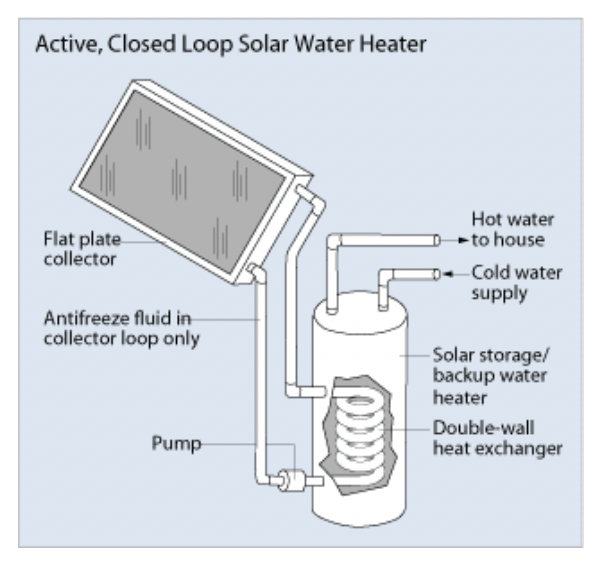Solar Thermal Systems
New CommercialWhat are Solar Thermal Systems?
Solar thermal systems, whether passive or active, utilize solar power or energy from the sun to heat water for domestic or process uses. Solar thermal water heating systems use tanks and solar collectors. Active water systems also use pumps and controls. Three common types of solar collectors include flat-plate collectors, integral collectors, and evacuated tube collectors. Flat-plate collectors consist of insulated and weatherproof boxes with a dark absorber plate under glass or plastic covers that heats water. Integral collectors use the same system as a flat-plate collector, but the water continues to a traditional hot water tank, ensuring a consistent supply of hot water. Evacuated tube collectors consist of rows of transparent tubes that allow water to pass through and heat quickly.[1]

Figure 1 – Solar Water Heater (Source: US DOE | Energy Savers: Solar Water Heaters)
Two main categories of solar thermal systems include concentrating versus non-concentrating, and low-, medium-, and high-temperature collectors. Concentrating collectors use lenses or mirrors to focus the rays of the sun. Non-concentrating collectors consist of a flat panel with the collector area equal to that of the absorber area. Low-, medium- or high-temperature refers to the operating temperature above the ambient temperature required or desired.
Table 1 – Solar Thermal Heating Systems by Level.[2]

How to Install Solar Thermal Systems
Solar Thermal Systems are complex and require project team members with renewable energy system expertise. The US DOE’s Federal Energy Management Program’s Guide to Integrating Renewable Energy in Federal Facilities offers advice on understanding renewable energy options, selecting appropriate types of renewable energy technologies, and integrating these technologies into all project phases. For implementation in New Jersey, project teams should contact the NJ Office of Clean Energy to learn about current programs, tools, and available funding. Critical project-specific variables to consider include location, space, energy costs, available project incentives, local net metering and interconnection policies. Pre-implementation steps for an on-site renewable energy system project comprise preliminary screening, a renewable energy feasibility study, sizing and design of systems.[3]
Hire an experienced solar thermal system installer, certified by the North American Board of Certified Energy Practitioners (NABCEP) to properly site and size the thermal solar system in coordination with standard plumbing trade work.
Example
Health Professions and Athletics Center, Wye Mills, MD.
Two high-efficiency propane-fired water heaters preheated by a solar thermal system generate hot water for this LEED Platinum facility.
Solar Water Heating in Multifamily Building, Greenfield, MA.
The Consortium for Advanced Residential Buildings (CARB), a US DOE Building America team, installed a solar domestic hot water (SDHW) system (372 ft2 evacuated tube, 330 gallons storage) as part a major renovation project that converted an old school building into 12 high-performance apartments.
Benefits
Solar thermal systems reduce greenhouse gas emissions, protect against the fluctuating costs of fossil fuels, and save on purchasing energy from utility companies while providing additional ecological and user benefits. Solar thermal systems reduce water consumption as well as the consumption of consumable, non-renewable, and often non-domestic energy sources such as natural gas.[4]
Costs
Solar thermal systems prove most cost-effective in locations with a consistent demand for heated water and high electric or natural gas prices. The average price of solar collector equipment varies depending on the type (low, medium, high temperature) and ranges from $1.94-$25.32 per square foot, averaging $7.01 per square foot.[5] The cost table below compares the average cost of solar thermal to conventional energy sources for 2017.
| New Jersey | Electricity | Natural Gas | Solar thermal |
| Average Cost per kilowatt-hour in commercial and industrial sectors: | 10.16-12.31¢[6] | 9.05¢[7] | 9.2-12¢[8] |
Resiliency
Solar water heaters offer energy system resiliency in that they can provide hot water needs without a need for electricity or natural gas when installed with additional hardware—including transfer switches, critical load panels, and appropriate controls.
[1] US DOE. Solar Water Heaters. https://www.energy.gov/energysaver/water-heating/solar-water-heaters (accessed April 12, 2018).
[2] EIA. Solar Thermal Manufacturing Activities. https://www.eia.gov/renewable/annual/solar_thermal/ (accessed April 23, 2018).
[3] US Dept of Energy’s (DOE) Federal Energy Management Program (FEMP). Guide to Integrating Renewable Energy in Federal Construction. https://www.wbdg.org/FFC/DOE/DOECRIT/re_construction_guide.pdf (accessed May 8, 2018).
[4] Denholm, P. 2007. “The Technical Potential of Solar Water Heating to Reduce Fossil Fuel Use and Greenhouse Gas Emissions in the United States.” National Renewable Energy Laboratory, Golden CO. https://www.nrel.gov/docs/fy07osti/41157.pdf (accessed April 23, 2018).
[5] US DOE | EIA. Form EIA-63A, “Annual Solar Thermal Collector Manufacturers Survey.” From table 2.12 at https://www.eia.gov/renewable/annual/solar_thermal/ (accessed April 23, 2018).
[6] US DOE | EIA. “Electricity Data Browser.” https://www.eia.gov/electricity/data/browser/#/topic/7?agg=0,1&geo=g004&endsec=u&linechart=ELEC.PRICE.US-ALL.A&columnchart=ELEC.PRICE.US-ALL.A&map=ELEC.PRICE.US-ALL.A&freq=A&ctype=linechart<ype=pin&rtype=s&maptype=0&rse=0&pin (accessed April 23, 2018).
[7] US DOE | EIA. “Natural Gas Prices.” 2017 Available for Commercial only https://www.eia.gov/dnav/ng/ng_pri_sum_dcu_SNJ_a.htm (accessed April 23, 2018).
[8] NREL. The U.S. Solar Photovoltaic System Cost Benchmark: Q1 2017. https://www.nrel.gov/news/press/2017/nrel-report-utility-scale-solar-pv-system-cost-fell-last-year.html (accessed April 23, 2018).
Related Strategies
Resources
- Commercial Building Tax Deduction Coalition
- Database of Incentives for Renewables & Efficiency – New Jersey
- ENERGY STAR solar water heaters
- Florida Solar Energy Center: Solar Thermal projects and programs
- NJ Clean Energy Program – SREC Registration Program
- NREL’s PVWatts Simulator
- Solar Estimate.org
- US Department of Energy Solar Water Heater Information
- Whole Building Design Guide: Introduction to Solar Water Heating
